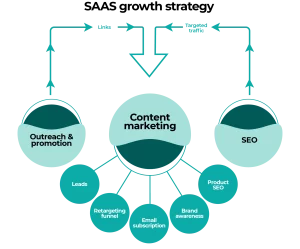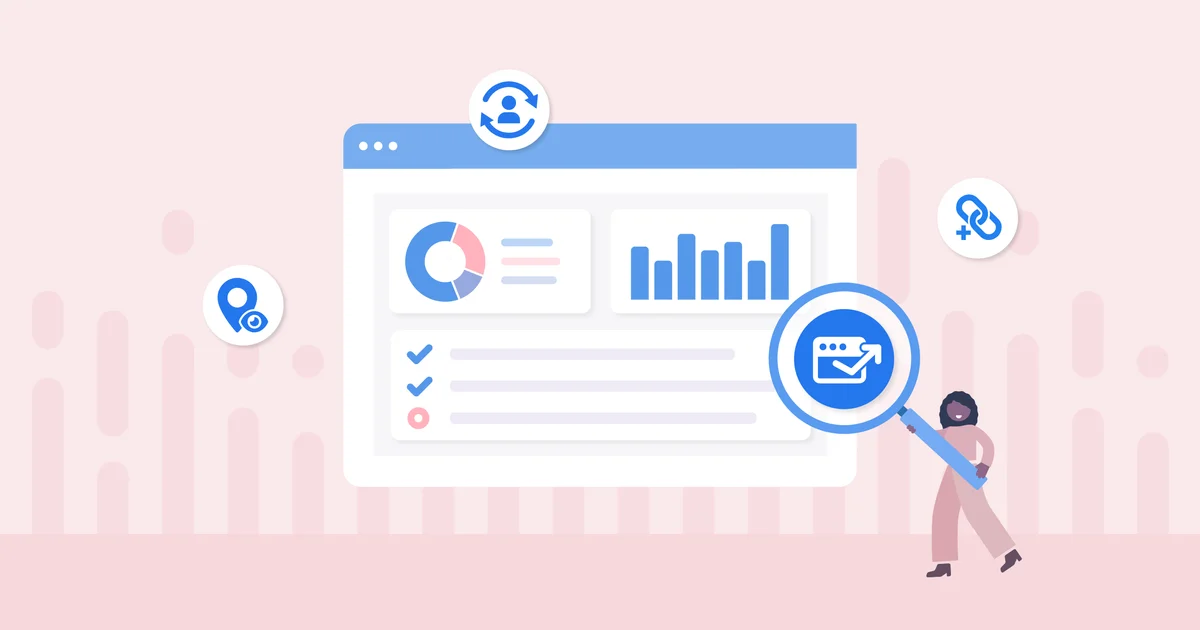SaaS SEO: SEO techniques to boost content marketing

SEO (Search Engine Optimization) is the most important aspect – and often the determining factor – of your content marketing success. The better the SEO, the higher the rank of your page in the search engine results and the greater the amount of traffic and leads. To put it simply, without proper SEO, your content marketing endeavor will most definitely fail. To avoid that, let us look into some of the most critical SaaS SEO Audit techniques that can help you rank your B2B SaaS website higher and make it more discoverable.
SaaS SEO linking
A common misconception about SEO is that it only involves keywords. But that is hardly the case. While keywords are an integral part of making your content relevant, it would barely be effective without a linking strategy. SaaS SEO linking, in fact, is one of the most critical factors that you should pay attention to if you want the search engines – and by extension new audiences – to pay attention to your B2B SaaS page. A robust SEO linking strategy should include the following three types of links:
- Internal links: These are the links you create to point toward other pages within your website to indicate their relevance and importance. A good example of internal linking would be to add a link to your service/product page in one of your blog posts that talks about the specific service/product.
- Outbound links: These are the links that point toward content outside your website. For instance, linking external reputable resources can help establish the authority of your content.
- Inbound links: More commonly called backlinks, these links point to your website from other external websites. This can help enhance outreach within your niche as well as help establish the authority of your brand.
SaaS technical SEO
Just like SEO linking, technical SEO is an equally and often neglected element of SaaS SEO strategy. SaaS technical SEO involves the optimization of the technical aspects of your B2B SaaS website, and includes the following:
- Page speed: As an important determining factor influencing the ranking of your website, you should pay special attention to ensure the improvement of page speed. You can do so by optimizing images, compressing files, and using a content delivery network (CDN).
- Crawlability: To drive the maximum amount of organic traffic from search results, it is crucial that your website’s pages are easily & seamlessly accessible by the search engine. This refers to crawlability.
- Indexability: Your webpages will only show up on the SERPs (search engine result pages) when they are indexed. Ensuring your website’s indexability will allow the search engine to analyze and add your web pages to its index or collection.
Now you know what SaaS SEO techniques to use to boost content marketing. But how do you ensure these techniques? How do you make sure that you are following the right SaaS SEO practices? There are two ways – firstly, you need to document the SEO techniques you use and tools you implement so that you can track what is working for your website and what is not; secondly, you need to carry out an SEO audit to identify any shortcomings, work on them, and improve SEO effectivity.
Let’s learn about SaaS SEO audits in detail.
SaaS SEO audit: Optimizing your content with the best B2B SaaS SEO practices
The term ‘audit’ literally refers to an official inspection or examination carried out in an organized way by an authority. Similarly, a SaaS SEO audit refers to a systematic website evaluation that assesses your B2B SaaS website’s ability to appear in SERPs (search engine result pages). Theoretically, an SEO audit will examine each of your SEO techniques and prospects, attesting that you are using the best SEO practices most effectively. As such, a SaaS SEO audit also pinpoints the shortcomings in your SEO implementation strategy and allows you to address the challenges, thereby ensuring substantial improvement in the status & authority of your website by facilitating enhanced performance.
SaaS SEO audit further allows you to boost your B2B content marketing by refreshing your old content – a technique that reportedly increases traffic to a post by at least 106 percent. You can do so by:
- Checking for broken links.
- Adding new internal links for new web pages or blogs.
- Optimizing your existing content with relevant keywords.
- Enhancing the quality of your content by adding recent statistics and facts.
- Improving the authority of your content by adding new outbound links to the newly added statistics and facts.
However, what precisely works for your SaaS website can depend on what it is lacking. And to identify these, you need to conduct a SaaS SEO audit.
Broadly speaking, there are 4 categories of SEO audit:
- On-page SEO audit
- Off-page SEO audit
- Technical SEO audit
- Analytics audit
Within and beyond these categories, the specific aspects of SEO that you need to examine include:
- Competitor research
- Keyword analysis
- Link prospecting
- Content analysis
Let us see how you can conduct a SaaS SEO audit.
On-page SaaS SEO audit
On-page SaaS SEO audit involves inspecting the quality of your on-page content and whether its SEO is up-to-date, working, and effective. You will have to consider a lot of elements including content analysis, keyword analysis, link prospecting, etc.
To make the process simpler, we have listed down all the important questions that you need to consider and tackle to carry out a successful on-page SaaS SEO audit. These are:
- Does your page satisfy search intent and delivers what the user is looking for?
- Is the content/page optimized with the relevant keywords?
- Is the keywords density proper, i.e., between 3-5 percent?
- Is the content plagiarism-free?
- Does the content/page meet the community guidelines?
- Are all of your pages (or a collection of pages) targeting the same keyword– called ‘keyword cannibalization – and eating up each other due to similar search intent?
- Does your content/page have the H1 tag, meta title, and meta description?
- Does the ALT tag of images used on your page contain the target keywords?
- Is your page indexed?
- Is the page layout navigable on all devices?
- Is the URL for your content/page optimized and clean?
- Are there any internal links, and if any, do they redirect to relevant pages?
- Are there any outbound links, and if any, do they redirect to relevant pages?
- Are there any broken links?
Off-page SaaS SEO audit
Conducting an off-page SEO audit is a little less complex than its on-page variation. The reason is simple: you have to make sure of two things – firstly, all the external links work (i.e., there are no broken links); and secondly, all the external links redirect to a high authority webpage because that is how the search engines determine the quality and value of your website/page.
So, here’s what you need to ask yourself, examine, and tackle to carry out a successful off-page SaaS SEO audit:
- Do the backlinks add to your website’s credibility?
- Are your referring domains (i.e., the sites that link to your website) legit, credible, and relevant content?
- Are there any spammy-looking links back-linked to your website?
- What is your domain authority? (This will be based on the quality and quantity of your backlinks; better backlinks = higher domain authority.)
- Are there any broken links?
Technical SaaS SEO audit
As described earlier, SaaS technical SEO involves the optimization of the technical aspects of your B2B SaaS website. So, the technical SEO audit will also concern the evaluation and re-optimization of the technical aspects, including page speed, indexability, navigation, etc.
As such, the questions that you should address are:
- Is your website/page well-indexed?
- Is Google indexing the right version?
- How fast does your website/page load and reloads?
- Is your website/page navigable on multiple devices like mobiles?
- Is your site architecture aligned with SEO?
- Are there any ‘404 Error’ pages?
- Is your page URL unique, properly formatted, and SEO-friendly?
- Are there any numbers, underscores, or combined words in your page URL?
- Is at least 25 percent of your page source code text and not HTML?
- Do you have an SSL certificate installed with your hosting provider?
- Are your XML sitemaps dynamically generated?
- Are you using robots.txt correctly?
- Is your page W3C validated and meets the standard requirements for clean source code?
SaaS analytics audit
Conducting an analytics audit means keeping track of your Google Analytics and ensuring that there aren’t any loopholes in your SEO strategy. Hence, the first important thing to do is to make sure that your Google Analytics Property is capturing the right data.
The following questions will help you analyze the quality of web data being captured by your Google Analytics and whether it is working effectively or not:
- Is the data being collected in line with your requirements?
- Is the configuration working for your website?
- Is the collected data accurate and reliable?
- Is there any incorrect tracking?
Conclusion
Companies that have an effective content marketing strategy in place experience a higher growth rate by up to 30 percent than those who do not. Indeed, there’s nothing like content marketing to boost your brand growth. However, developing a sound content marketing strategy for B2B SaaS and conducting SaaS SEO audits can be an intimidating rabbit hole for some. As such, it is easy to lose yourself in the innumerable technicalities that B2B SaaS content marketing holds. But with a little help from SEO professional services, you can entirely transform your apprehensions regarding content marketing into a considerably productive endeavor.






